The third edition of the Climate Change Action Groups (CCAGs) was a space for dialogue and exchange of experiences between public servants at the subnational level that allowed them to hear first-hand about experiences, successes and areas of opportunity in the implementation of projects on green infrastructure, circular economies, society and climate. This initiative has been created by the Deutsche Gesellschaft für Internationale Zusammenarbeit (GIZ) GmbH in collaboration with the Mexican Association of Municipal Planning Institutes (AMIMP), the Mexican Climate Community (CCM) and Local Governments for Sustainability (ICLEI).
Held from 4 to 7 July, the GACCs focused on a specific theme each day. In total, 596 people participated, and 25 sessions were held to share experiences about case studies and the implementation of best practices at the local level. For example, three keynote speeches by representatives from Germany discussed examples of important projects that address the impacts of climate change – from the experiences of various cities such as Freiburg in the circular economy; the Berlin Climate Change Action Plan 2022-2026; and the Hamburg Green Network.
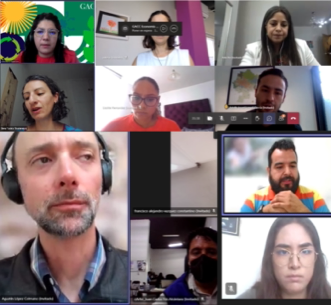
Below, find a summary of the four days of the GACC.
Green Infrastructure
The focus of the first day was on green infrastructure. Green infrastructure can be used, for example, to reduce runoff in times of rainfall by harnessing the retention and absorption capacities of vegetation and soil. In these cases, green infrastructure, in addition to meeting the needs of human societies, can increase carbon sequestration, improve air quality, mitigate the urban heat island effect and increase resilience in vulnerable populations, such as coastal cities.
One of the experiences highlighted was that of Tuxtla Gutiérrez, Chiapas, in particular the process of developing its municipal green infrastructure standard and how coordination between different areas of the municipal government supports such initiatives. The Green Infrastructure Network promoted by GIZ Mexico through the CiClim and BIOCITIS projects was presented.
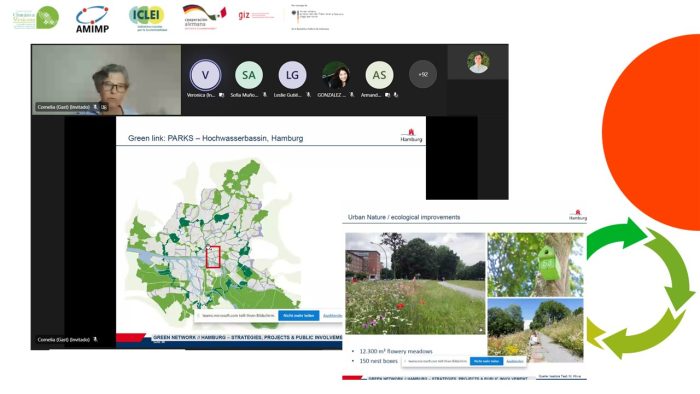
Circular Economy
On the second day, experiences were exchanged on circular economy instruments, sustainable consumption of electronic devices and inter-municipal solutions to reduce plastic pollution. They also discussed the implementation of energy efficiency and how it can reduce pressure on the environment, improving efficiency in the supply chain of raw materials and promoting economic growth and increased employment.
During the parallel sessions, state authorities expressed strong interest in generating a shared network of knowledge and information on recycling centres and events through the RAECO mobile application implemented by GIZ. Representatives from Chiapas, Chihuahua and the State of Mexico showed interest in including their own events in the application.
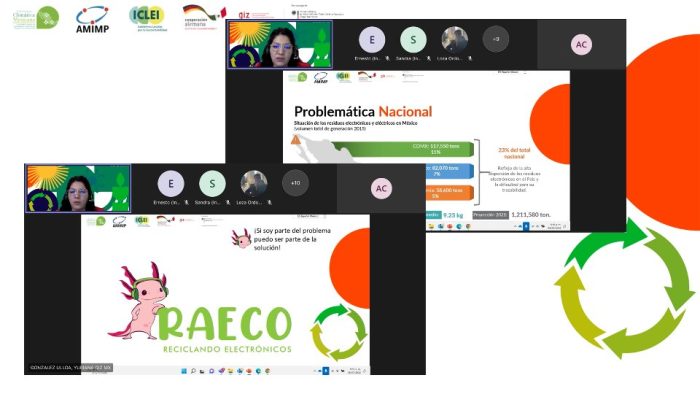
Society and Climate Change
The cornerstone of the third day was the role of society in climate change. They discussed how different sectors of society play a key role in climate governance because the willingness of business, government, academia and civil society can have a positive or negative impact on the fight against global temperature rise.
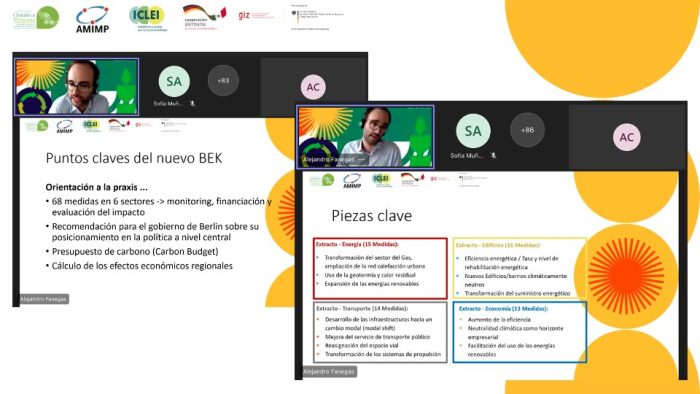
Digitalisation tools
Finally, the last day addressed the importance of digital tools in accelerating the transition towards a circular economy and the fulfilment of the Sustainable Development Goals (SDGs), especially as related to the ultimate goal of improving the quality of life in urban populations.
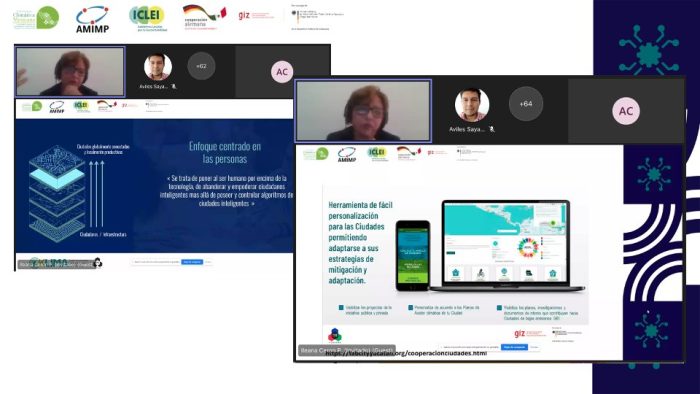
The creation of this type of space for the exchange of ideas and experiences allows for the construction of synergies between public and private sector actors at the local, national and international level to learn about progress, challenges and opportunities, as well as to create alliances in the fight against climate change.
Thus, for the third consecutive year, the GACCs have collaborated to strengthen and improve communication and the implementation of local projects that contribute significantly to the achievement of the Sustainable Development Goals and climate change mitigation and adaptation.
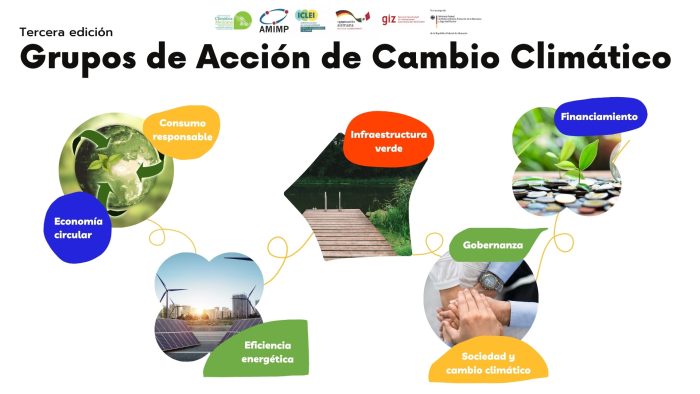
Check the summary of the event here
Press:
- Arranca en México la tercera edición de los Grupos de Acción de Cambio Climático
- Cierran con éxito la edición 2022 de los Grupos de Acción de Cambio Climático en el ámbito local
- Cierra la edición 2022 de los Grupos de Acción de Cambio Climático
- Alianza México-Alemania realiza acciones para mitigar el cambio climático
Presentations:
Day 1
10:00 – 11:00 Ponencia magistral Friburgo y la economía circular
11:00 – 12:30 Sesiones paralelas
- Infraestructura verde ¿para qué normar esta nueva forma de hacer ciudad?
- Infraestructura verde para resiliencia en ciudades costeras ¿cómo le damos forma?
- Mecanismos de financiamiento para la Infraestructura Verde
- El espacio público como elemento estratégico para el desarrollo sostenible de una ciudad
- Infraestructura verde en la Sierra de Zapalinamé
Day 2
10:00 – 11:00 Ponencia magistral La Red Verde de Hamburgo y los procesos de participación ciudadana
11:00 – 12:30:
- Soluciones intermunicipales para reducir la contaminación plástica (marina)
- Consumo sustentable de aparatos electrónicos
- Retos y oportunidades para la implementación de la eficiencia energética bajo un enfoque de Economía Circular
Day 3
10:00 – 11:00 Ponencia magistral Plan de Cambio Climático de Berlín 2022-2026
11:00 – 12:30:
- El reto de la eficiencia en el sector de vivienda social
- Implicaciones del cambio climático en la igualdad del género y la defensa de los derechos humanos a través de la acción climática
- “La ciudad que necesitamos”: Implementación en Tuxtla Gutiérrez, Chiapas
- Retos y oportunidades para la gobernanza climática
- Financiamiento para la acción climática ambiciosa
- La transversalidad del cambio climático
Day 4
10:00-10:40 ¿Cómo la digitalización ayuda al desarrollo sustentable de las ciudades?
10:50-11:40
10:50-12:40
- Mi Mercado
- Blaucorp: recolección y revalorización de residuos para ciudades
12:40-13:20
13:20-13:45 Presentación del Centro de Transformación Digital (DTC México)
